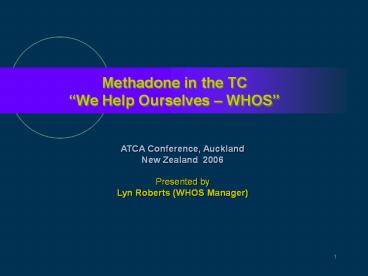ATCA Conference, Auckland - PowerPoint PPT Presentation
1 / 19
Title:
ATCA Conference, Auckland
Description:
Methadone in the TC 'We Help Ourselves WHOS' 2. Acknowledgements. Garth Popple - Executive Director, WHOS. Peter Connie -Treatment Services Manager, WHOS ... – PowerPoint PPT presentation
Number of Views:48
Avg rating:3.0/5.0
Title: ATCA Conference, Auckland
1
Methadone in the TC We Help Ourselves WHOS
ATCA Conference, Auckland New Zealand
2006 Presented by Lyn Roberts (WHOS Manager)
2
Acknowledgements
- Garth Popple - Executive Director, WHOS
- Peter Connie -Treatment Services Manager, WHOS
- Carla Janssen - Research Officer, WHOS
- Shane Darke - Associate Professor, National Drug
and Alcohol Research Centre (NDARC) - WHOS MTAR staff and clients
3
This Presentation
- WHOS - We Help Ourselves
- MTAR - Methadone to Abstinence Residential
- WHOS research project
- Conclusions
4
We Help Ourselves
- WHOS was established in 1972
- First AOD Therapeutic Community (TC) in
Australia - Users self-funded and ran the service
- Name of We Help Ourselves due to self-help nature
- Five TCs in NSW and one in Queensland
5
WHOS MTAR
- Methadone to Abstinence Residential
- First MTAR TC in Australia (1999)
- Established through demand
- (approximately 25,000 people on Methadone 1999)
- Exit strategy required to assist people off MMT
6
MTAR - A Modified TC
- 4 to 6 months program plus aftercare
- Methadone / Buprenorphine Withdrawal Regime
- Drug free treatment goal
- Harm minimisation strategies included
- Main differences from traditional TC
7
Research Aims
- Client population profile
- Treatment episodes (duration, early departure,
achievement of treatment milestones) - Drug use, life style and well-being at follow up
- Comparing baseline and follow up data
- Feedback on treatment program
8
Research Methodology
- Baseline data collected on admission and stored
on external health funded database - N 72 treatment episodes (1 July 03 - 31 Dec
04) - Development of follow up data collection tool
- Conducted follow up interviews with ex-clients
- Compared pre- and post-treatment data
9
Demographics
- Gender 63 males, 37 females
- Mean age 33 (range 20 - 53)
- 9 Aboriginal/Torres Strait Islander descent
- 93 born in Australia
10
Client Profile at Follow Up
- 83 - drug use became problematic before reaching
21st birthday - Mean age first started using heroin18 (range 11
28) - Mean age first enrolled into opioid substitution
program 25 (range 14 - 43 years old) - On average this was 7 years after starting using
heroin (range 1 - 30 years) - 71 had used street methadone
11
Health
- In the three months before admission
- 23 spent time in hospital
- 17 disclosed suicidal thoughts and 6 attempted
suicide - 10 had at least one overdose
- 26 on psychiatric medication
- (40 females, 20 males)
12
Drug Use Baseline vs follow up
- Drug use in the month preceding interview
13
Drug Use - Continued
14
Reasons for Relapse
- 90 difficulty in handling negative feelings such
as depression, anxiety and/or anger - 63 leaving treatment prematurely
- 60 stressful event or situation
- 53 problems or conflicts with partner and/or
family - 53 difficulty in handling positive feelings
15
Duration of Stay Outcomes
- Average duration treatment episode 103 days
16
Research Limitations
- Research timeline ideally clients to be
interviewed at a consistent time after admission
or cessation - Attributing changes in clients drug use, health
and social situation to WHOS MTAR treatment - Small sample size
17
Conclusions (1)
- Respectable follow up rate of 71
- Almost half of ex-clients (46) interviewed were
abstinent from alcohol and other drugs in the
month before follow up and over half of this
group had been abstinent continuously since
leaving WHOS MTAR
18
Conclusions (2)
- Those that were abstinent at follow up had
significantly better social functioning and lower
psychological distress levels than those not
abstinent - Those that were abstinent at follow up had
improved significantly in social functioning and
psychological distress levels when compared with
their functioning before MTAR treatment - Longer treatment duration shows improved outcomes
at follow up
19
Where To From Here
- Development of Stabilisation Service
- (Treatment Goal gt Stabilisation not Abstinence)
- For people who cannot comply with abstinence
- People who have developed mental health
challenges during MTAR treatment (Time out) - Problematic complex needs clients, clients
discharged from MTAR - Clients released from prison / drug court































